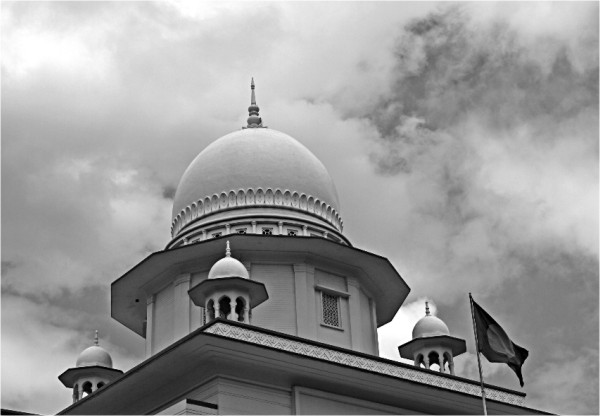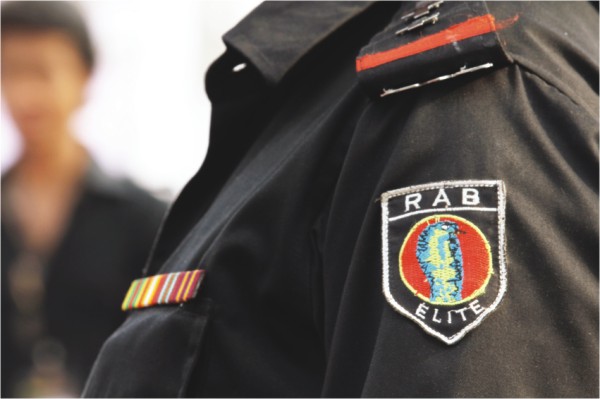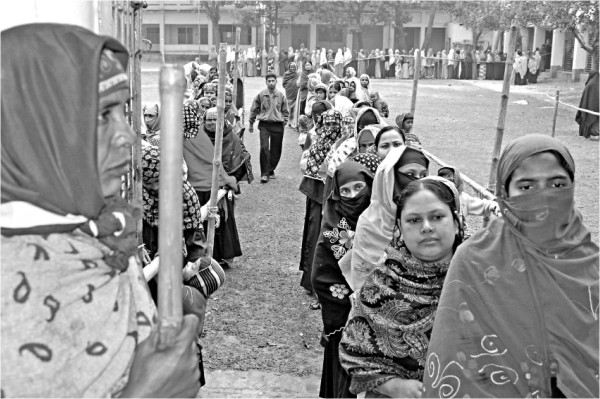 |
||||||||||||
Working democracy: A stocktaking--Dr. Kamal Hossain Politics invading culture--Serajul Islam Chowdhury Bangladesh at 40: Addressing governance challenges -- Barrister Manzoor Hasan, Dr. Gopakumar Thampi and Ms. Munyema Hasan Party government and partisan government-- Dr. Mizanur Rahman Shelley Is rule by the majority enough?-- Mohammad Abu Hena The rubric of good governance --Mohammad Badrul Ahsan For a human rights culture -- Professor Dr. Mizanur Rahman For an independent Human Rights Commission-Sayeed Ahmad Of this and that -- Sultana Kamal Tribalist corruption-- Mohammad Badrul Ahsan Fighting terrorism: Enforcement challenges--Muhammad Nurul Huda Combating corruption: People are watching-- Iftekharuzzaman E-government and its security-- Dr. M Lutfar Rahman CHT Accord: Implementation a half empty glass -- Devasish Roy Wangza Citizenship and contested identity: A case study -- Bina D'costa and Sara Hossain Forty years of "yes ministership"-- Mahbub Hussain Khan Politician-bureaucrat interface-- AMM Shawkat Ali Impartial bureaucracy: A fading dream-- Nurul Islam Anu Forty years... and diverse governments--Syed Badrul Ahsan Protect environment, save the nation--Morshed Ali Khan
|
||||||||||||
 Photo: SK. Enamul Haq |
||||||||||||
Of this and that Sultana Kamal The presence of Dr. Afia Dil and Dr. Anwar Dil at the Rokeya Memorial Lecture in the Rokeya Hall of Dhaka University on December 9th, 2010 brought back memories of the Fifties, when Afia Apa used to visit my mother at our Tarabagh residence. Going down memory lane, I remembered the scribe titled 'Of this and that' which Afia Apa's daughter not even ten years old at that time produced with her writings on different subjects. I acknowledge my indebtedness to her for the title of this piece. The friendship between Afia Apa and my mother was based on their common concern for the political, social and cultural state of East Pakistan, as it was then, and of course regarding the plight of women. Afia Apa called my mother 'Amma'. So did her husband, Dr. Anwar Dil, who in fact first met Sufia Kamal completely independently in Karachi when, interestingly enough, Afia Apa and Anwar Bhai were not even married. In Dr. Anwar Dil's own words from his book 'Bangladesh, An Intercultural Mosaic', “I saw a lady in white sari walking towards us. From her photographs in Mah-e-Nau magazine I recognised her as Begum Sufia Kamal. As she came and stood by us on the side of the grave the first memory that flashed on my mind was of Biji, my mother who had the same dignified bearing. I said my salam to her and addressed her as Amma.” This book by Dr. Dil is one of four of a series on Bangladesh, the other three being 'Bangladesh: An Intercultural Memoir', 'Bangladesh: An Intercultural Panorama' and 'Bangladesh: An Intercultural Collage'. 'Bangladesh, An Intercultural Mosaic' details the author's feelings for Bangladesh through the portrayal of the life and works of Bengali personalities such as Qazi Nazrul Islam, Qazi Motahar Husain, Sufia Kamal, Saber Reza Karim, Lulu Bilquis Banu and Laila Arjuman Banu some better known to the Bengali nation than others. As I leafed through the book, I was overwhelmed by the emotional involvement with which the author wrote about these Bengalis! Hasnat Abdul Hye, a noted writer and a former Secretary of the Government of Bangladesh, wrote in his foreword to the book, “ Only a person with deep interest and limitless curiosity to know about a people, its history and variegated culture and enduring love and respect for those persons discussed could produce a book (books) of such sweeping excellence and gripping interest”.
It is perhaps worth mentioning that Dr. Dil was born in Jullundur, Punjab, was raised and educated in different provinces of Pakistan and had never lived in Bangladesh! How many of us Bangladeshis hold Dr. Dil's passion for our own people? Though the book centres around the above personalities, it also mentions stalwarts such as Rokeya Sakhawat Hossain, Rabindranath Thakur, Zainul Abedin, Muhammad Nasiruddin, Abbasuddin, Quamrul Hasan, Munier Choudhury, political figures such as A.K. Fazlul Huq, Abul Hashim, Bangabandhu Sheikh Mujibur Rahman, and many others whose contributions towards the making of Bangladesh can never be overstated. Rokeya's 130th birth anniversary has just passed in December. She was remembered by some in a cursory manner and nothing more. Sufia Kamal, whose birth centenary is approaching in June 2011, was also paid only a token tribute by a few groups on her death anniversary in November. Most of the others mentioned in the book except some are just forgotten souls. This dementia afflicts us with an endemic cultural bankruptcy that we all suffer from and pass on to our descendants. This is not at all a loss to those people we fail to pay respect to, but to us as a nation. To save ourselves from this, we have no other way but to bring back our national pride by reclaiming the heritage and inheritance bestowed upon us by those great personalities.
The Transparency International Report (Global Barometer) revealed a perception that there is a high degree of corruption among the Police of Bangladesh. This has provoked quite a sharp reaction from the authorities. There was a similar reaction to the Transparency International Bangladesh (TIB) survey “Service Sector Corruption: National Households Survey 2010” in which the sampled households shared their experience with 13 service sectors from government and non-government institutions between June 2009 and May 2010. According to the Report, judiciary was the most corrupt service sector in Bangladesh. It found that 88 per cent of the households coming in contact with the Courts reported corruption and harassment, such as demands for bribes, inaction and delay in disposing of cases. The Report also found that lawyers, court employees, court clerks and brokers took money to hasten or postpone hearings, to withdraw or destroy case documents and to influence judgements. Reacting to the allegations of Police corruption, the concerned authorities threatened to challenge the Report in the Courts, but somehow did not go beyond merely expressing their dissatisfaction and annoyance in the media.
Three different lawyers, on the other hand, filed defamation cases one in Comilla and two in Chittagong for 'demeaning the judiciary'. The honourable Court in Comilla not only took the case into cognisance with immediate effect, but also issued arrest warrants without any delay in the morning against the Chairman, the Executive Director and the researcher of TIB, which is a rare reaction in the history of defamation cases. The case filed in Comilla was dismissed on technical grounds by the same evening. The two Chittagong Courts, however, have issued summons to the three TIB officials. In the meantime, the Supreme Court sent a letter to TIB asking it to submit detailed information, including the questionnaire and answers of the respondents of the household survey, after finding the Report 'unclear' and 'incomplete'. This, to many, comes as a sad commentary on the degree of tolerance demonstrated by the concerned authorities and unbecoming of a democratic system. Many are of the opinion that the people have every right to express their views and TIB has an equal right to collect, collate and publish those views for the people to make their own opinion. Others say that public opinion surveys are used all over the civilised world, including by media and political parties to gauge the pulse of the voters about certain government policies and actions. The Executive Director of TIB, however, has explained TIB's position by saying, “We consider as very positive the Supreme Court's attention to our report.” As far as the information goes, TIB has decided to send the questionnaire and answers of the survey to the apex court. We hope good sense will prevail on all sides, ending the controversy over such a vital issue.
2010 has gone by. As we usher in the New Year with renewed hope and expectations for a brighter human rights situation, we also are obliged to review the same for the past year. As we see it, the human rights situation was rather mixed. We happily have a few positive examples to cite. We have seen the process of bringing the war criminals to trial started, the National Human Rights Commission has been reformed and new Commissioners appointed. In the area of women's rights, the Act to prevent family violence has been passed, it has been proposed that the length of maternity leave be extended to six months, and the national CEDAW report has been submitted. There has been some progress made in the field of child rights as well. The amendment to the child rights policy has been finalised, the draft for the Children's Act 2010 has been adopted in principle by the Cabinet, and Bangladesh has been awarded the MDG medal for having considerably reduced the child mortality rate. Bangladesh has adopted the International Criminal Court Act, has produced an excellent education policy and also has launched initiatives to work for the implementation of the Chittagong Hill Tracts Accord. There were also a number of very encouraging directives from the High Court. The High Court declared the 5th Amendment of the Constitution void and the 7th Amendment illegal. The declaration of fatwa has been made illegal, corporal punishment in educational institutions has been prohibited and the imposition of religious dress codes in educational institutions and workplaces has been banned. It has been made obligatory for the state to take over the responsibility of a child born out of rape. All these are good signs of the country's respect for the norms of human rights, though how much of it will be realised in people's lives remains a serious question.
The graver human rights concern, of course, centres around the issue of extra-judicial killings and the new phenomenon that has been added to it forced disappearance. Family members report that people are being picked up by Forces in plain clothes, never to return. It may be that the people in plain clothes do not belong to the police force, but is it not the responsibility of the State to resolve such a situation? We unfortunately do not see any such effort. Rather, the explanations given by some of the State representatives are so unclear and unconvincing that it leaves people feeling more suspicious. We have also witnessed confrontations between militant groups in educational institutions causing loss of life. There has been a rise in violence against women, particularly in the form of stalking, which has resulted in the sad deaths of a number of victims. This has continued despite serious attempts by the Government and various social groups to prevent it. The impunity enjoyed by selected political favourites and the Government's move to exempt some convicted criminals has led people to believe that the justice system is not being allowed to work independently. However, despite all its limitations and under-achievements, according to the Transparency International Global Barometer, the majority of the respondents expressed their confidence in the Government to eradicate corruption from the society. We can take pride in the fact that Bangladesh has shaken off its image as a country with fundamentalist influences and established its identity around the world as a progressive nation. We hope for the same level of success in all areas of human rights. The writer is a Human Rights Activist and a former Advisor to the caretaker government.
|
||||||||||||




